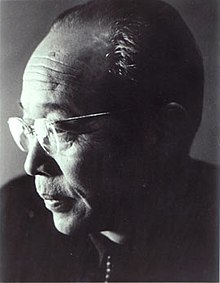Kenji Mizoguchi
| Kenji Mizoguchi | |
|---|---|

Kenji Mizoguchi
|
|
| Born |
May 16, 1898 Hongo, Tokyo, Japan |
| Died | August 24, 1956 (aged 58) Kyoto, Japan |
| Other names | Goteken |
| Occupation | film director, screenwriter, editor |
| Years active | 1923–1956 |
Kenji Mizoguchi (溝口 健二 Mizoguchi Kenji?, May 16, 1898 – August 24, 1956) was a Japanese film director and screenwriter.
Mizoguchi's work is renowned for its long takes and mise-en-scène. According to writer Mark Le Fanu, "His films have an extraordinary force and purity. They shake and move the viewer by the power, refinement and compassion with which they confront human suffering."
His film Ugetsu (1953) won the Silver Lion at the Venice Film Festival, and appeared in the Sight & Sound Critics' Top Ten Poll in 1962 and 1972. Other acclaimed films of his include The Story of the Last Chrysanthemums (1939), The Life of Oharu (1952), and Sansho the Bailiff (1954).
Mizoguchi was born in Hongo, Tokyo, one of three children. His father was a roofing carpenter. The family was modestly middle-class until his father tried to make a living selling raincoats to soldiers during the Russo-Japanese war. The war ended too quickly for the investment to succeed; his family circumstances turned abject and they had to give his older sister up "for adoption" and moved from Hongo to Asakusa, near the theatre and brothel quarter. In effect his sister Suzuko, or Suzu, was sold into geishadom - an event which profoundly affected Mizoguchi's outlook on life. Between this and his father's brutal treatment of his mother and sister, he maintained a fierce resistance against his father throughout his life.
...
Wikipedia
